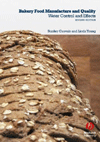The 1859 Charles Dickens classic historical novel “A Tale of Two Cities” begins with a statement of startling extremes, “It was the best of times, it was the worst of times…”
Such is the case for the baking industry—and our global society—since the dawn of 2020. The COVID-19 pandemic has pushed society and our economy to unprecedented limits, significantly impacting industry dynamics for the foreseeable future.
Overview | Bread | Tortillas | Sweet Goods | Snack Cakes | Pizza | Desserts | Cookies | Buns & Rolls | Bars | Breakfast Products
Looking back
“The past year has been the most dynamic 12 months I have ever seen for our great industry,” says Robb MacKie, president and CEO, American Bakers Association (ABA), Washington, D.C. “The biggest observation I have from the past year that’s particularly prominent and important is the strength, resiliency, and innovation of the baking industry.”
Just last September, the world’s bakers, suppliers, and equipment manufacturers convened at IBIE, the Western Hemisphere’s largest baking trade show, to grow business and explore new ingredients and processes, notes MacKie. “Since then, and especially during the ongoing COVID-19 crisis, our members have shown such resiliency in the face of both adversity and prosperity. It’s been amazing to see how our members and the industry are holding true to their core values of protecting their employees, feeding their communities, and caring for their customers while quickly, nimbly, and efficiently changing how the operate on a daily basis.”
COVID-19 has pushed the baking industry to extremes. “We can say it was the best of times, and it was the worst of times,” says MacKie. “The booming business of some of our members is rightly overshadowed by the sheer gravity of this ongoing situation. For our members who primarily focus on foodservice and QSR, we’ve heard stories of lines being shut down completely due to lack of new orders. While that’s slowly coming back, we’re now being faced with the grim reality that our workforce, the heart of operations, can get—and are getting—sick. The baking industry has been, and will continue to be, a role model for others, fiercely and proactively protecting the health and well-being of our employees. Our members have, unsurprisingly, taken an aggressive approach to temporarily shuttering and slowly reopening facilities in order to protect these employees, which I think speaks to the values of our industry.”
According to Ash Gurney, key account technical services manager, Dawn Food Products, Jackson, MI, and an American Society of Baking (ASB) Board of Directors member, the past year has seemed like a tale of two industries. “Two trends seem to stand out in particular: distinct division of an industry wanting informed, elevated, indulgent products, and volume output, cost-driven ‘for the masses’ style products.”
As the COVID-19 pandemic upended society, the baking industry saw dramatic highs and lows depending on the market segment and product focus, says Gurney. “For instance, breads were up, sweet goods were down. Many industry response decisions were based on the overriding laws or restrictions in each region and the organic ability to pivot product lines to meet market demands vs. capital expenditures and the post-COVID market outlook.”
COVID-19 has caused a high demand for sandwich bread, says Rod Radalia, vice president, product innovation and integrity, Aunt Millie’s Bakeries, Fort Wayne, IN, and 1st vice chairman, ASB Board of Directors. “We expect that to stay for some time as consumers will be slow in returning to what was normal day-to-day eating, which included frequent dining out. Though the strongest demand was for mainline breads, we wonder if that will continue going forward. If more meals—and sandwiches—are eaten at home, will consumers look for greater variety? By purchasing more variety breads, the consumer brings more uniqueness and excitement to their homemade meals. This could be satisfaction they need until they feel comfortable with dining out again.”
During the pandemic, bakeries and suppliers have focused on select SKUs in order to streamline production and keep up with demand, says Trent Wanamaker, vice president of national accounts, Cain Food Industries, Inc., Dallas, and 2nd vice chairman, ASB Board of Directors. “Another effective strategy has been consolidating production of specific SKUs to fewer bakeries allowing for longer runs while covering a broader area. An industry trend I see emerging from this pandemic is a focus on SKU optimization and utilization of improved extended-shelf-life technologies to allow bakeries to schedule longer and more-efficient runs.”
Streamlining operations for more-flexible control can help bakers improve efficiency in uncertain times. “We have seen an interest in controls platforms that allow for preventive and proactive maintenance of process equipment locally and remotely,” says Rod Harris, executive account manager, Shick Esteve, Kansas City, MO, and an ASB Board of Directors member. “Clients and vendors have found ways to maintain communication and accessibility to each other for servicing of ongoing projects and maintenance. A slowdown in future investment is expected to be temporary, but long-term changes to site visits, site surveys, training, and commissioning of equipment will take place. Specifically, personal protection, number of participants, and timing of events will impact sales, project execution, and startup of projects. A project cycle may take longer than previously.”
Looking forward
Gurney sees three key trends that will prove important in the coming year: food safety, clean label, and shelf life.
“In the coming year, we will see a continuation of consumers wanting a cleaner ingredient label,” says Radalia.
“Consumer desire for plant-based claims continues to rise, while clean-label shows no signs of slowing,” says Sarah Moore, senior research scientist, Campbell Snacks, Camden, NJ, and an ASB Board of Directors member. “The definition of clean label, as fluid as it already is, will continue its evolution to keep up with consumer expectations.”
In addition to cleaner-label manufacturing, Harris also points to emerging and ongoing trends related to equipment and plant sanitation audits, hygienic equipment design, National Fire Protection Association (NFPA) compliance, and risk assessment regarding safety of personnel and equipment.
“Workforce issues have been top-of-mind for years, and the current crisis highlights and exacerbates the critical need for a healthy, appreciated, well-trained workforce,” says MacKie. “In the past several years, and more recently, in the past several weeks, ABA has been active in creating solutions for the industry to help address this key issue. First, as the coronavirus situation quickly escalated, ABA worked closely with the representatives of the entire food supply, as well as the FDA, USDA, and White House Task Force, to ensure guidance was put into place to not only keep the food supply operational, but to also keep our employees protected and healthy. Our members have always put the health and safety of their employees first and have only escalated those efforts.”
Our industry’s employees are at the heart of our operations, and showing consistent appreciation of those employees will be more important than ever this year, suggests MacKie. “ABA has created several resources, including a video in both English and Spanish, to help our members show appreciation to our workers who are #BakingStrong #FeedingUS.”
The fluidity of the current situation shows how important it is to quickly and seamlessly onboard and train new and existing employees, says MacKie. “In the coming months, ABA will be scaling up our online training capabilities to help our members train employees coming to the bakery from other industries.” This training will be in addition to ABA’s existing offerings.
“Most recently, the need to recruit employees to the baking industry has become even more pressing,” says MacKie. “The wholesale baking industry is working diligently to ensure a safe and abundant food supply for Americans during the unprecedented event of the COVID-19 outbreak, and ABA member companies are looking to hire more than 3,300 permanent and temporary employees.”
Because of this urgent need, ABA moved up the development and launch of its new baking careers hub: www.BakingWorks.org. “This hub, which is a proven model in many other industries, will help our members recruit new employees ranging from entry level to the executive suite. We’re excited about the opportunities to tell this new audience about our great industry,” says MacKie.
It’s during these extremely trying times that ABA demonstrates its full value and core of its mission. “Years of consistent, thoughtful, and thorough service as the voice of the baking industry laid the groundwork for our organization to deliver results during the COVID-19 pandemic like never before,” says MacKie. “ABA looks forward to continuing to meet our significant industry-wide goals while serving our members, working together to keep our industry #BakingStrong.”
Overview | Bread | Tortillas | Sweet Goods | Snack Cakes | Pizza | Desserts | Cookies | Buns & Rolls | Bars | Breakfast Products











